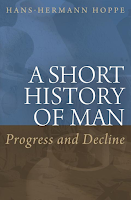For even if as a result of such decentralist tendencies new State governments should spring up, whether democratic or otherwise, territorially smaller States and increased political competition will tend to encourage moderation as regards a State's exploitation of productive people. Just look at Liechtenstein, Monaco, Singapore, Hong Kong, and even Switzerland, with its still comparatively powerful small cantons vis-a-vis its central government. Ideally, the decentralization should proceed all the way down to the level of individual communities, to free cities and villages as they once existed all over Europe. Just think of the cities of the Hanseatic League, for instance. In any case, even if new little States will emerge there, only in small regions, districts, and communities will the stupidity, arrogance, and corruption of politicians and local plutocrats become almost immediately visible to the public and can possibly be quickly corrected and rectified. And only in very small political units will it also be possible for members of the natural elite, or whatever is left of such an elite, to regain the status of voluntarily acknowledged conflict arbitrators and judges of the peace.
~ Hans-Hermann Hoppe, A Short History of Man: Progress and Decline, pp. 131-132


No comments:
Post a Comment